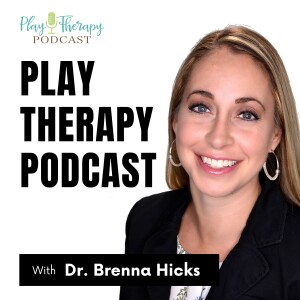
Sexual Behaviors Directed At The Therapist Theme In Play Therapy
 2024-01-09
2024-01-09
Download
Right click and do "save link as"
In this episode, I delve into the challenging theme of sexual behaviors directed at the therapist in play therapy sessions. This difficult subject can manifest in various ways, from sexualized contact to exhibitionism or attempts to view the therapist's body. I discuss the potential meanings behind these behaviors, including a need to test trust, seek approval, or mimic learned actions from exposure to inappropriate content. It's crucial to approach this issue with caution, understanding that such behaviors may not always indicate abuse but require careful observation and documentation. While setting clear boundaries is essential, it's equally important to maintain unconditional love and acceptance for the child. Navigating these situations with sensitivity and a focus on the child's emotional well-being is key.
Podcast HQ: https://www.playtherapypodcast.com
Play Therapy Training HQ: https://www.playtherapynow.com
APT Approved Play Therapy CE courses: https://childcenteredtraining.com
Email me: brenna@thekidcounselor.com
Follow me on Twitter: @thekidcounselor https://twitter.com/thekidcounselor
References:
Cochran, N., Nordling, W., & Cochran, J. (2010). Child-Centered Play Therapy (1st ed.). Wiley.
VanFleet, R., Sywulak, A. E., & Sniscak, C. C. (2010). Child-centered play therapy. Guilford Press.
Landreth, G. L. (2002). Play therapy: The art of the relationship (2nd ed.). Brunner-Routledge.
Bratton, S. C., Landreth, G. L., Kellam, T., & Blackard, S. R. (2006). Child parent relationship therapy (CPRT) treatment manual: A 10-session filial therapy model for training parents. Routledge/Taylor & Francis Group.
Benedict, Helen. Themes in Play Therapy. Used with permission to Heartland Play Therapy Institute.
More Episodes
Sorting Play Theme In Play Therapy
 2023-10-31
2023-10-31
 2023-10-31
2023-10-31
Mess-Making Play Theme in Play Therapy
 2023-10-24
2023-10-24
 2023-10-24
2023-10-24
Cleaning Play Theme In Play Therapy
 2023-10-17
2023-10-17
 2023-10-17
2023-10-17
Instability Theme In Play Therapy
 2023-10-11
2023-10-11
 2023-10-11
2023-10-11
Bridge-Building Play Theme In Play Therapy
 2023-10-03
2023-10-03
 2023-10-03
2023-10-03
Self-Fixing Theme In Play Therapy
 2023-09-26
2023-09-26
 2023-09-26
2023-09-26
Failure To Fix Theme In Play Therapy
 2023-09-20
2023-09-20
 2023-09-20
2023-09-20
Fixing Play Theme In Play Therapy
 2023-09-07
2023-09-07
 2023-09-07
2023-09-07
Broken Play Theme in Play Therapy
 2023-08-30
2023-08-30
 2023-08-30
2023-08-30
Burying Or Drowning Theme
 2023-08-24
2023-08-24
 2023-08-24
2023-08-24
Fire Play Theme In Play Therapy
 2023-08-15
2023-08-15
 2023-08-15
2023-08-15
012345678910111213141516171819
Create your
podcast in
minutes
- Full-featured podcast site
- Unlimited storage and bandwidth
- Comprehensive podcast stats
- Distribute to Apple Podcasts, Spotify, and more
- Make money with your podcast
It is Free
- Privacy Policy
- Cookie Policy
- Terms of Use
- Consent Preferences
- Copyright © 2015-2024 Podbean.com





